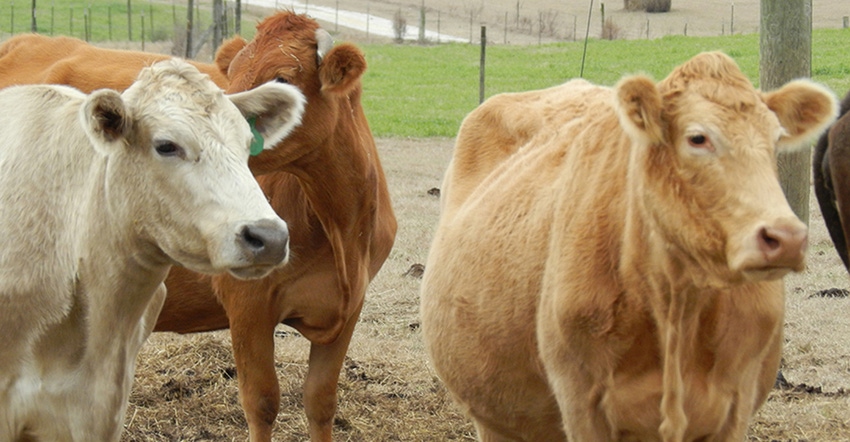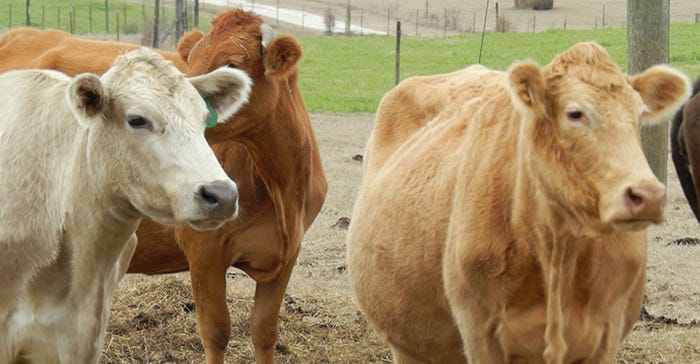An animal’s diet has a huge effect on hoof quality and overall hoof health. In particular, protein, fat, calcium, zinc, copper and selenium play very important roles. Supplementation of these key nutrients can help your livestock maintain or improve hoof health.
February 13, 2018

Sponsored Content
Late winter/early spring is usually a time of muddy sloppy conditions, which can spell trouble for hooves. From cracked hooves to foot rot, poor hoof health takes a toll on your livestock, no matter what the species. Wet, sloppy conditions just exacerbate hoof problems, softening them up, making them more susceptible to injury and microbial entry. The best way to combat poor hoof health is to grow a strong, hard hoof in the first place.
The Biology of a Hoof
Hooves are primarily composed of protein…namely a special kind of protein called keratin. Keratin is composed of amino acids and forms twisted strands (much like a spring) that gives it extra strength and elasticity. Then those many strands twist together (just like a rope). Additionally, they link together by sulfur bonds between sulfur-containing amino acids in opposing keratin strands to give added strength.
The outermost layer contains fats and waxes in addition to the dead keratin. This layer of fats and waxes seals moisture in the hoof when the layer is intact. This layer also gives the hoof it’s shine and smoothness.
How Nutrition Impacts Hoof Health
The quality of the overall diet is often very evident in the appearance of hooves since they are so metabolically active. In general, a hoof will grow out and replace itself in roughly one year (quicker in very young animals!). Since hooves are composed of mainly of protein and fats, it is obvious that animals receive adequate levels of both of crude protein and fatty acids, particularly sulfur-containing amino acids for non-ruminants. But what you may not realize is that mineral nutrition also plays a vital role in hoof health. Calcium is required for activation of the enzyme needed to form keratin. It is also required for the process of creating crosslinks between keratin fibers. Zinc is very important for hoof growth and maintenance. It is an essential mineral in the formation of keratin. Zinc is also influences calcium usage by the body. Additionally, zinc plays a very important role in the formation of superoxide dismutase enzyme involved in antioxidant activity. Specifically, superoxide dismutase prevents the fats and oils in the hoof from oxidizing. When these fats oxidize it breaks the protective seal and causes the hoof to become dry and brittle. Copper is critical for the formation of crosslinks in the keratin that keep the hoof strong and hard. Copper is also a critical component of superoxide dismutase described above. Selenium plays an important antioxidant role in the hoof, also protecting the fats from oxidation.
Animals marginal to deficient in the nutrients in bold above are most likely to experience the following symptoms:
Slow hoof growth
Soft hooves
Cracks
Abscesses
Laminitis
Thin hoof wall
Foot rot/Thrush
Feeding for Hoof Health
The specifics and amounts of what is necessary for optimum hoof health will vary from specie to specie. But in general, all the nutrients listed above are necessary. In general, crude protein and fats aren’t lacking in animals grazing ample amounts of green, growing pastures. Calcium deficiency is usually not an issue for most as well, especially in areas with hard water. However, zinc, copper and selenium are marginal to deficient in most soils across the United States. For this reason, most livestock respond well to supplementation of these three trace minerals (copper is the exception, as many breeds of sheep and Jersey dairy cattle are susceptible to copper toxicity).

Self-Fed Supplement Products
Independent research has shown time and time again that organic, chelated forms of trace minerals are more efficiently digested by the body and retained in tissues for later use. CRYSTALYX® Brand Supplements offers the new CRYSTALYX® Blueprint® line of self-fed supplements for beef cattle that exclusively deliver organic Bioplex® trace minerals. The Blueprint® line of CRYSTALYX® supplements deliver essential levels of nutrients known to positively influence hoof health.
In summary, an animal’s diet has a huge effect on hoof quality and overall hoof health. In particular, protein, fat, calcium, zinc, copper and selenium play very important roles. Supplementation of these key nutrients can help your livestock maintain or improve hoof health. Please remember that the hoof grows relatively slowly, so it may take months to notice an improvement and can take a year or more to obtain full benefits. CRYSTALYX® Brand Supplement products can help you make sure your livestock get the nutrients they need for healthy, strong hooves.
About the Author(s)
You May Also Like



